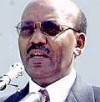NEWS REPORT
Draft Press Law Designed To Cut off Ethiopia from the World, Say Press Freedom advocates
Close to 300 participants, including MoI representatives, embassies, Ethiopia and Addis Ababa Chambers of Commerce, members of the House of Peoples’ Representatives, Ethiopia’s former president, Dr. Negaso Gidada, and Ethiopian Teachers Association President, Dr. Taye Woldesemayat, among others, were at the workshop, held at the Semien Hotel. Study papers were presented at the workshop on the Ethiopian media situation: an overall survey, the new draft press law as examined from the free press perspective, the right to access to information under the new press law and the role of the executive body, restrictions imposed on advertisements and distribution of the press publications under the press law and code of ethics and a press council. Participants who commented on the study papers and the draft press law said that the provision imposed on importing and distributing international publications, the fact that the draft press law stated that any information from abroad should be determined whether or not it has to be distributed locally by MoI, would encourage prior censorship and subsequently it would block the flow free information from countries outside of Ethiopia. They also said the provision that categorizes any announcements and press releases from NGOs, embassies and international organizations regarding their accomplishments should be considered as commercials would cast a dark shadow on the country’s diplomatic relations with other countries. “I could hardly believe that such provisions were included in the draft press law,” said Bedru Adam of the House of Peoples’ Representatives. He said the whole idea of the draft was intended to discourage the development of freedom of expression and the prevailing development of Information Technology. “It should be replaced by an environmentally friendly press law and members of the media should come up with such a workable press law,” he said. In his study paper on the new press law examined from the free press perspective, Amare Aregawi, publisher and editor-in-chief of The Reporter publication, discussed details of the disadvantages of the draft press law. Amare dismissed the whole idea of the draft and said, “It is totally unconstitutional and violates some of the international agreements the country had signed willingly to establish a free press.” Dr. Negaso Gidada, on his part, expressed his deep concern that the development of freedom of expression was like going from the “frying pan into the fire.” He said the draft press law would completely undermine the existing minimum amount of democratic development. “When I first came across the draft press law, I asked myself, “Are these people crazy?” He went on “I was also wondering whether the legislative had read article 29 of the Ethiopian Constitution that declares independence and complete freedom of expression.” Among the principal personalities who condemned the draft press law were Dr. Taye Woldesemayat, Lidj Michael Imru, a former Prime Minister in the early years of Ethiopian revolution, executive committee members of four locally registered opposition parties, representatives of professional associations, private lawyers and veteran journalists. The majority of them said the draft press law was intended to undermine the role of the media in the country’s economic development. Following is a Joint Statement Issued by participants of the Workshop, Namely, the Ethiopian Free Press Journalists Association (EFJA), Publishers, Editors, Editorial Staff of the Free Press and media Professionals Regarding the New Draft Press law
1. This workshop is a historic meeting at which we forged our unity and took a position in the interests of our common survival and well-being; that, we would further consolidated our cooperation to avoid our shortcomings in terms of observing our professional code of ethics and to overcome the obstacles that we face at various stages in the performance of our activities. 2. We do accept the new press law drafted by MoI on the grounds that
3. We would not limit ourselves to expressing our protest against the draft press law; that we would also prepare an argument that would focus on the main points around which our protest revolves, put forward the problems and recommended solutions; that would gather the support of all participants and engage in activities that are directed for enriching the document. 1. That the issue related to the press council strictly lies within the domain of journalists; that it should be established primarily by journalists and stakeholders [relevant] bodies; that we should continue to gather the common views and ideas of participants and, by scrutinizing these views reach a stage where they would prepare a solid document 2. That we are opposed to the draft press law because it has sidelined the main stakeholders, namely, the private press publishers, journalists and that are directly concerned and that it has not been enriched through discussions carried out in good faith. Whenever the government calls meetings to the free press, it should extend invitations to all concerned without any discrimination and the meeting should serve as platforms for conducting democratic discussions and not as instruments for receiving directions. |


